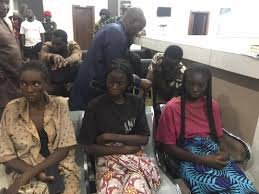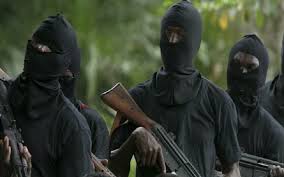Just at press time the two Kaduna based journalists and the family members kidnapped last week regained their freedom. It is therefore, in light of the plight of the poor journalists that Korede Abdullah focused this special report, even as the spate of kidnapping for ransom increase


Kidnapping for ransom in Nigeria has assumed a frightening dimension. Despite the cries of woes by Nigerians, all the efforts made by government at all levels to tame the Frankenstein monster, has not yielded much fruitful result.
Going by the frequency of abduction incidents in the country and number of victims, it has become an albatross and mysterious social phenomenon of which effort to get to its roots seem to have defied solutions.
The history of kidnapping for ransom in Nigeria dates back to the early 2000s. It first reared its ugly head in the Nigeria’s oil rich Niger Delta region where irate youth agitators took expatriates working with multinational oil giants hostage.

Those expatriates were taken hostage in order to force oil companies operating in the poor communities to carry out community development projects for the benefit of their hosts or force government enter into negotiations for more of economic advantages and benefits to the deprived people of the oil rich Niger Delta region.
Ever since, the criminals with different nomenclatures like bandits, terrorists, armed robbers, and so on, have taken to kidnapping as a means of economic survival. It has assumed an industrial scale and multi-billion naira criminal enterprise.
The criminal activities of the perpetrators have become so daring and notorious that it has negatively affected the image of Nigeria globally. The country has gained such a notoriety that it is now trailing in infamy, countries like, Columbia, Syria and Mexico with vicious criminal gangs.
Africa Health Report gathered that while there are some of abductions, especially in the flashpoints of the northern part of the country that are not reported, however, many of such incidents are given wide media coverage.
The Nigerian risk consultancy SBM Intelligence said it has recorded 4,777 people abducted since President Bola Ahmed Tinubu took office in May 2024 with billions of naira paid as ransom.
On February 29, suspected Boko Haram insurgents abducted over 200 internally displaced people, mainly children, in the Ngala Local Government Area of Borno State.
On March 7, some criminal gangs kidnapped 287 students, including many girls, at the government secondary school in Kuriga town, in northwestern Kaduna State.
On March 9, bandits broke into a boarding school in Gidan Bakuso village in Sokoto State and kidnapped 15 children as they slept. On March 18, over 87 people were reported to have been kidnapped in Kajuru community in Kaduna State. Also on March 18,
The plethora of kidnappings are not restricted to the northern parts of the country. The activities of the criminal gangs continue unabated in the south. The only difference is the fact that, the north has been considered their flashpoints, as many of their states have been infested with different terrorists groups and bandits.
Abductions of Journalists and Their Families

The growing crisis of kidnapping has raised new questions after two prominent journalists and their families were grabbed from their Kaduna homes on Saturday night, July 7, 2024 in a commando-like manner with intense gunfire.
AbdulGafar Alabelewe of The Nation newspaper and AbdulRaheem Aodu of Blue Print newspaper were abducted from their homes in Kaduna’s Millennium City, located in Chikun county, 5 miles from the city center.
Alabelewe was reportedly taken along with his wife and two children, while one of his daughters was left behind due to illness. Aodu and his wife were also abducted.
According to the AHR investigations, the kidnapping of the journalists took place around 10 p.m. when a group of heavily armed terrorists invaded the area.
The incident has continued to spark concern about press freedom and the safety of media professionals in Nigeria, with a large swarth ungoverned spaces captured by different bandit gangs and other terrorist groups.
Why Targeting Journalists?
The motive of abductors
According to a source who preferred anonymity, the reason why the two journalists were targeted was obvious. Unlike other professionals like doctors and bankers who are believed to have deep pockets, journalists are considered not to be rich.
“You know their kidnapping in itself is a well-orchestrated operation. The kidnappers know the media organizations they work for. And they want to gain maximum attention and huge ransom from the rich and powerful owners of the newspapers.”, the source said.
The two kidnapped journalists work for very prominent newspapers with alleged affiliations with influential political figures in the country. For instance, The Nation is rumoured to be owned by the Nigerian President, Bola Ahmed Tinubu, while Blueprint has connection with Mohammed Idris, the current Nigeria Minister of Information and National Orientation.
For the first three days (72 hours) after the abduction of the journalists, nothing was heard about their whereabouts as there was no any communication regarding negotiations with the abductors. Up to Friday afternoon, nearly six days after the incident, the kidnappers had not made any ransom demands.
The Journalists Regained Freedom
Exactly a week after their abduction, the two journalists, Alabelewe and Aodu were rescued from their abductors’ hostage on July 13.
The Chairperson of the Nigeria Union of Journalists (NUJ) Kaduna State Council Asma’u Yawo Halilu confirmed the release of their freedom in a statement.
The statement read in part: “To the glory of God Almighty, our colleagues, Abdulgafar Alabelewe, Abduraheem Aodu, and their families have been released.
“The Council extends her profound gratitude to the office of the CP, Kaduna State Command, office of the NSA, the DG, DSS, the Inspector General of Police, Kaduna State government, the NUJ President, and all well-meaning Nigerians that prayed along with us during the trying time.”
The newspaper gathered that the rescued journalists have been taken to Abuja for debriefing by security agencies and as well as to get urgent medical attention.
Efforts of The Military And Police
The Minister of Defence, Mohammed Badaru, said no fewer than 9,300 bandits and terrorists have been neutralised within the last one year by the Nigerian Armed Forces.
The minister made the disclosure at the Ministerial Sectoral Briefings, organised by the Ministry of Information, to mark the first anniversary of President Bola Tinubu’s administration on Thursday in Abuja in May.
He also announced that about 7,000 other kidnappers and terrorists were arrested, and 4,882 assorted weapons and 83,900 ammunition recovered. He further added that 4,641 victims of kidnapping were rescued within the period under review.
On July 5, the Lagos State Police Command also killed a nine-man suspected kidnap gang within the state. The suspects were tagged “billionaire kidnappers because of the high-profile and rich individuals who were their targets and the huge amount of ransom they collected from their victims.
Our correspondent gathered that the command’s Special Squad One Team achieved the feat when it engaged the men around the Ajao, Okota, Isolo, and Ladipo axis of the state. The police source said five AK-47 rifles and two SUV jeeps were recovered during the operations.
While confirming the incident in a media briefing later in the day, the spokesman of the Lagos State Police Command Benjamin Hundeyin said the feat was owing to an intelligence report.
“The kidnappers who were caught unawares would not give up easily as they engaged the police officers in a shoot-out. They of course bowed to the superior firepower of the police. Nine of them were neutralized while two escaped with gunshot injuries.”, the PPRO said.
“Four AK-47 rifles, four locally-made semiautomatic pistols, nine AK47 magazines, three walkie-talkies, one POS machine, and a loudspeaker were recovered from them. Also recovered are their two operational vehicles: one black Toyota 4Runner and a blue Lexus RX350. Meanwhile, investigations are ongoing to arrest the fleeing suspects.”, he added.
Many security and legal experts have blamed the resurgence of kidnapping on the shoddy way government has taken the perpetrators with a kid’s gloves and the manner in which the abductors of innocent citizens are given a slap in the wrist when they are apprehended.
“Many of the kidnappers are languishing in different detention facilities across the country without trial. At the end of the day, they will be released without any cogent reason. How do you think their activities will go down?” said Rufai Kareem, a retired soldier.
To Mr Umoru David, a legal practitioner, “The enabling laws are not potent enough coupled with the institutional deficiency which makes the conviction of those arrested for the crime drag on for a very long period of time in the court of law. This has continued to embolden the criminals to continue to perpetrate their nefarious activities unabated.”
Impacts Of The Kidnappers Activities On The Country
The criminal activities of the kidnappers have impacted negatively on the socio-economic lives of the people. There are some routes which have become red zones for people to ply, especially in the north.
Some of those who spoke with the newspaper said that many social activities have been canceled because of the fear of being kidnapped. The kidnappers are so ruthless that they kill their victims sometimes after ransom has been paid. They also detain their victims indefinitely until ransom worth millions (and sometimes billions) of naira is paid to secure their release.
Solutions To Kidnapping Activities
In order to stamp out kidnapping, according to responders who spoke with the newspaper, the government should impose a heavy penalty on the perpetrators of the heinous crime. They said the penalty should carry a death sentence in order to serve as a deterrence.
“The government should have a political will to sign the death warrant of the those convicted and sentenced to death. When the criminals pay the supreme price, it will send a positive signal to others that crime does not pay.” said Umoru.
They said that government should beef up the security architecture and shore up the intelligence gathering. Security experts said that apart from the regular police, Nigeria has other intelligence agencies. They contended that what is required is to fund those agencies to enhance their jobs.
The experts also harped on the issue of the morale of the military personnel which they said should should be boosted by giving all the necessary support in terms of funding and modern equipment. Apart from this, the people of the community must give information to the security agents so as to ease their work.
Some of the experts were of the view that the government should discourage the people from paying ransom. They said the government should rather be more proactive in its efforts to fight the menace. They added that with seriousness on the part of government, coupled with the political will, kidnapping will become a thing of the past. Will the Nigerian government wield a big stick against the perpetrators of kidnapping? Time will tell.



